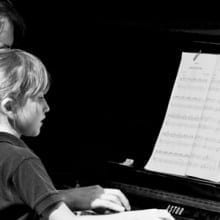The Main Principles Of "Common Mistakes to Avoid When Teaching Piano"

The fine art of piano playing is not just about attacking the proper keep in minds. It requires an understanding of rhythm, melody, and analysis – elements that are greatly affected through one's cognitive and emotional procedures. This is where psychology comes in to play in effective piano teaching.
鋼琴班 of psychological science in piano teaching is to comprehend how trainees discover, process details, and create their skill-sets. It checks out the cognitive, emotional, and personality parts that affect a student's potential to play the piano properly. By recognizing these factors, instructors can easily modify their mentor methods to meet the personal needs of each pupil.
One of the major places where psychology plays a essential job in efficient piano teaching is incentive. Incentive is necessary for pupils to advance and obtain their objectives. Teachers require to know what motivates each pupil separately and utilize this know-how to urge them towards effectiveness.
Motivation can happen from different resources such as private enthusiasm in music or external benefits like acknowledgment or appreciation. An successful educator will definitely recognize what steers each trainee and use this expertise to develop an engaging learning atmosphere that cultivates development.
An additional essential part where psychological science plays a essential task is moment recognition. Piano students need to always remember pieces they have found out so they may conduct them along with simplicity eventually on. Moment loyalty entails a number of mental procedures such as interest, impression, encoding, storage space, and retrieval.
Instructors must know how these processes operate so they can help trainees keep info effectively. For instance, breaking down a piece into smaller segments and duplicating it numerous opportunities helps with inscribing details right into long-term moment.
Psychology additionally participates in a vital task in understanding how emotions impact finding out outcomes. Emotions influence intellectual handling by either enriching or impairing attentional focus and decision-making capacities.
For instance, anxiety may detrimentally impact functionality amounts through triggering diversions such as intrusive thought and feelings or bodily signs and symptoms like drinking hands or sweating palms; whereas favorable emotional states like enthusiasm or happiness rise engagement levels leading to better functionality end results.
Reliable teachers identify how emotions affect discovering and produce a good learning environment that encourages psychological regulation and well-being.

Eventually, psychological science plays a crucial duty in understanding private distinctions in learning. Every pupil has actually special intellectual capabilities, learning designs, individualities, and inspirations. Educators require to recognize these distinctions and use them to adapt their training methods.
For circumstances, some students might learn better through visual help while others may favor hands-on tasks or verbal illustrations. Effective educators utilize this knowledge to adapt their teaching type and produce personalized learning experiences for each student.
In verdict, the duty of psychological science in efficient piano mentor cannot be underrated. Instructors who comprehend how psychological science impacts finding out can assist pupils attain their complete ability by developing a customized learning environment that cultivates motivation, mind recognition, psychological policy, and individual distinctions. Through carrying out therefore, they can assist pupils ended up being efficient pianists who not only attacked the best notes but additionally comprehend the art of songs interpretation.
